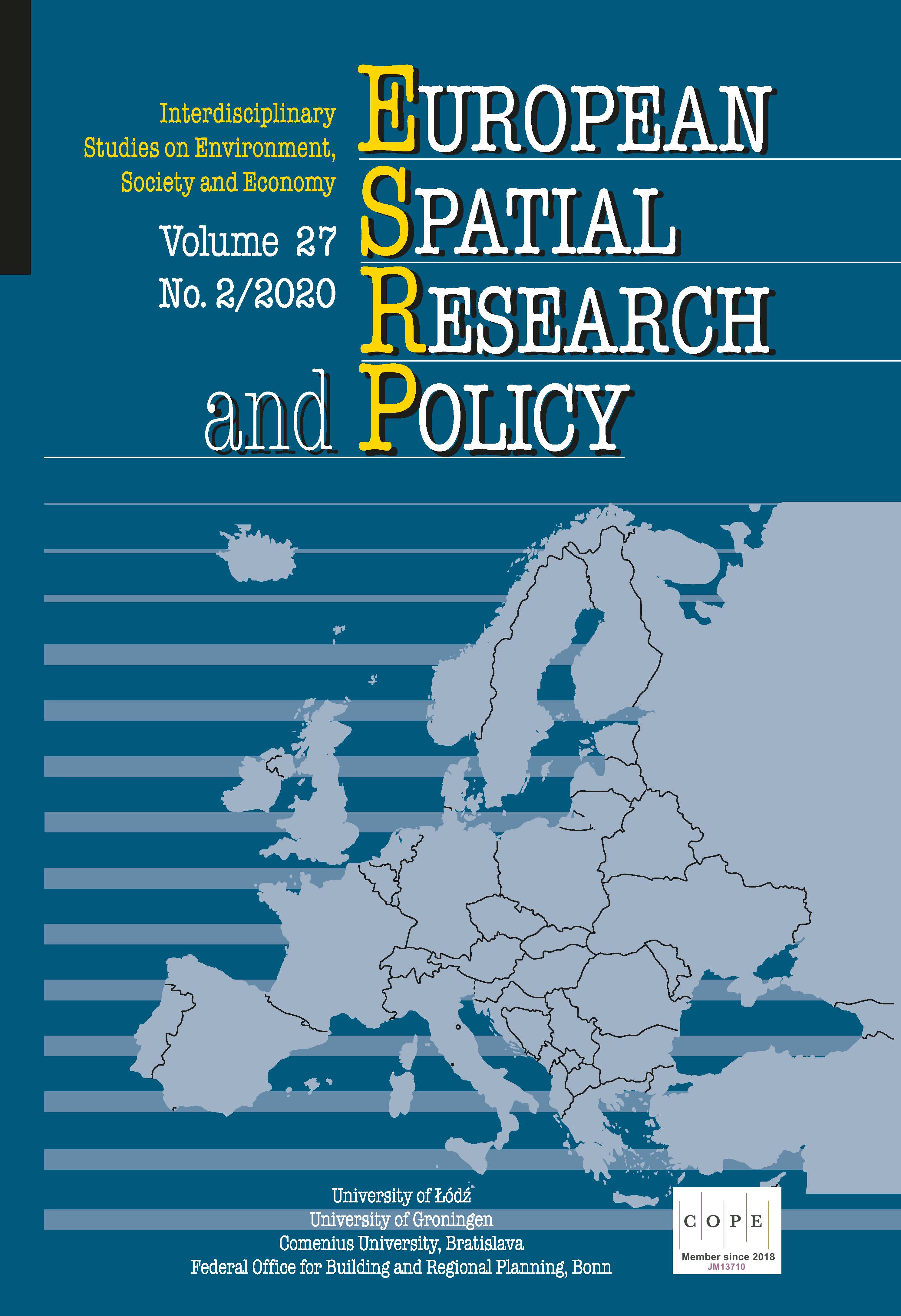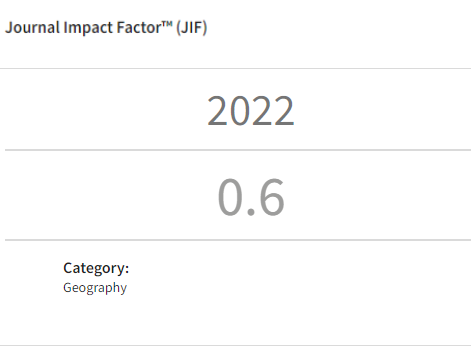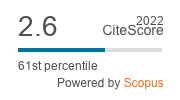Citizen involvement in waste management and circular economy in cities: Key elements for planning and implementation
DOI:
https://doi.org/10.18778/1231-1952.27.2.08Keywords:
circular economy, circular city, waste management, citizen involvement, collaborative governanceAbstract
This paper identifies and explores key elements for planning and implementing citizen involvement in the area of waste management and circular economy in cities. The analysis has shown that institutions responsible for waste management regard strategic planning, inclusivity, transparency, continuity, and resources as particularly important for reaching the objectives of citizen involvement. However, not all of the four analysed cities have applied these elements to the same extent, due to e.g. a lack of a strategy for citizen involvement, or limited personal and financial resources.
Downloads
References
AJZEN, I. (1991), ‘The Theory of Planned Behavior’, Organizational Behavior and Human Decision Processes, 50 (2), pp. 179–211.
Google Scholar
DOI: https://doi.org/10.1016/0749-5978(91)90020-T
AMIU (AZIENDA MULTISERVIZI E D’IGIENE URBANA) (2018), Business Plan 2018–2020 [Piano Industriale 2018–2020].
Google Scholar
ANSELL, C. and GASH, A. (2008), ‘Collaborative Governance in Theory and Practice’, Journal of Public Administration Research and Theory, 18 (4), pp. 543–571.
Google Scholar
DOI: https://doi.org/10.1093/jopart/mum032
ARNSTEIN, S.R. (1969), ‘A Ladder of Citizen Participation’, Journal of the American Institute of planners, 35 (4), pp. 216–224.
Google Scholar
DOI: https://doi.org/10.1080/01944366908977225
BARR, S., GUILBERT, S., METCALFE, A., RILEY, M., ROBINSON, G.M. and TUDOR, T.L. (2013), ‘Beyond recycling: An integrated approach for understanding municipal waste management’, Applied Geography, 39, pp. 67–77.
Google Scholar
DOI: https://doi.org/10.1016/j.apgeog.2012.11.006
BEHÖRDE FÜR UMWELT UND ENERGIE (2018), Abfallstatistik 2017: Siedlungsabfälle, https://www.hamburg.de/contentblob/11362522/efad41bd4c34a3c09d7ade2a8ba4ca2c/data/d-statis-tik-siedlungsabfall-2017.pdf [accessed on: 01.04.2019]
Google Scholar
BERNSTAD, A. (2014), ‘Household food waste separation behavior and the importance of convenience’, Waste Management, 34 (7), pp. 1317–1323.
Google Scholar
DOI: https://doi.org/10.1016/j.wasman.2014.03.013
BICKERSTAFF, K. and WALKER, G. (2001), ‘Participatory Local Governance and Transport Planning’, Environment and Planning, 33 (3), pp. 431–451.
Google Scholar
DOI: https://doi.org/10.1068/a33173
BORTOLETO, A.P., KURISU, K.H. and HANAKI, K. (2012), ‘Model development for household waste prevention behaviour’, Waste Management, 32 (12), pp. 2195–2207.
Google Scholar
DOI: https://doi.org/10.1016/j.wasman.2012.05.037
BUNDESMINISTERIUM FÜR VERKEHR UND DIGITALE INFRASTRUKTUR (2014), Handbuch für eine gute Bürgerbeteiligung. Planung von Großvorhaben im Verkehrssektor, Berlin, https://www.bmvi.de/SharedDocs/DE/Publikationen/G/handbuch-buergerbeteiligung.pdf?__blob=publicationFile [accessed on: 16.12.2019]
Google Scholar
BUTTERISS, C. (2016), ‘What is community engagement, exactly?’, Bang the Table, web log post 10 July, https://www.bangthetable.com/blog/defining-community-engagement [accessed on: 21.03.2019]
Google Scholar
CHAKRABORTY, S. and STRATTON, R. (1993), ‘An integrated regional approach to risk management of industrial systems’, Nuclear Safety, 34 (1), pp. 1–8.
Google Scholar
CORNWALL, A. (2006), ‘Historical perspectives on participation in development’, Commonwealth and Comparative Politics, 44 (1), pp. 62–83.
Google Scholar
DOI: https://doi.org/10.1080/14662040600624460
COPENHAGEN CLEANTECH CLUSTER (2012) Denmark: we know waste, Copenhagen.
Google Scholar
CSOBOD, É., GRÄTZ, M. and SZUPPINGER, P. (2009). Overview and Analysis of Public Awareness Raising Strategies and Actions on Energy Savings, Report no. INTENSE/Deliverable 6.1/ WP6/Year 2009, http://www.intense-energy.eu/uploads/tx_triedownloads/INTENSE_WP6_D61_final.pdf [accessed on: 16.12.2019]
Google Scholar
DESA, A., KADIR, N.B.Y.A. and YUSOOFF, F. (2011), ‘A Study on the Knowledge, Attitudes, Awareness Status and Behaviour Concerning Solid Waste Management’, Procedia Social and Behavioral Sciences, 18, pp. 643–648.
Google Scholar
DOI: https://doi.org/10.1016/j.sbspro.2011.05.095
EMERSON, K., NABATCHI, T. and BALOGH, S. (2012), ‘An Integrative Framework for Collaborative Governance’, Journal of Public Administration Research and Theory, 22 (1), pp. 1–29.
Google Scholar
DOI: https://doi.org/10.1093/jopart/mur011
EMERSON, K. and NABATCHI, T. (2015), ‘Collaborative governance regimes’, Georgetown University Press, Washington, D.C.
Google Scholar
EUROPEAN COMMISSION (2020), Circular Economy, https://ec.europa.eu/growth/industry/sus-tainability/circular-economy_en [accessed on: 28.06.2020]
Google Scholar
EUROPEAN ENVIRONMENTAL AGENCY (2016), Municipal Waste Management. Country Factsheet – Portugal.
Google Scholar
EVISON, T. and READ, A.D. (2001). ‘Local Authority recycling and waste – awareness publicity/promotion’, Resources Conservation and Recycling, 32 (3–4), pp. 275–291.
Google Scholar
DOI: https://doi.org/10.1016/S0921-3449(01)00066-0
FORESTER, J. (2008), ‘Making Participation Work When Interests Conflict: Moving from Facilitating Dialogue and Moderating Debate to Mediating Negotiations’, Journal of American Planning Association, 72 (4), pp. 447–456.
Google Scholar
DOI: https://doi.org/10.1080/01944360608976765
FREY, B.S. and OBERHOLZER-GEE, F. (1997), ‘The Cost of Price Incentives: An Empirical Analysis of Motivation Crowding-Out’, The American Economic Review, 87 (4), pp. 746–755.
Google Scholar
GLASS, J.J. (1979), ‘Citizen Participation in Planning: The Relationship Between Objectives and Techniques’, Journal of the American Planning Association, 45 (2), pp. 180–189.
Google Scholar
DOI: https://doi.org/10.1080/01944367908976956
GRODZINSKA-JURCZAK, M., BARTOSIEWICZ, A., TWARDOWSKA, A. and BALLANTYNE, R. (2003), ‘Evaluating the Impact of a School Waste Education Programme upon Students’, Parents’ and Teachers’ Environmental Knowledge, Attitudes and Behaviour’, International Research in Geographical and Environmental Education, 12 (2), pp. 106–122.
Google Scholar
DOI: https://doi.org/10.1080/10382040308667521
HAGE, O., SANDBERG, K., SÖDERHOLM, P. and BERGLUND, C. (2008), ‘Household Plastic Waste Collection in Swedish Municipalities: A Spatial-Econometric Approach’, European Association of Environmental and Resource Economists Annual Conference: 25–28.06.2008, pp. 1–30.
Google Scholar
INTERNATIONAL ASSOCIATION FOR PUBLIC PARTICIPATION [IAP2] (2014), IAP2’s Public Participation Spectrum, https://www.iap2.org.au/Tenant/C0000004/00000001/files/IAP2_Public_Participation_Spectrum.pdf [accessed on: 16.12.2019]
Google Scholar
JÄCKEL, K., FODOR, M. and PAPP, J. (2015), ‘Environment conscious consumers’ opinion on selective waste management’, Journal of Contemporary Economic and Business Issues, 2 (2), pp. 5–22.
Google Scholar
JOSHI, A., KALE, S., CHANDEL, S. and PAL, D.K. (2015), ‘Likert Scale: Explored and Explained’, British Journal of Applied Science and Technology, 7 (4), pp. 396–403.
Google Scholar
DOI: https://doi.org/10.9734/BJAST/2015/14975
MAIBACH, E. (1993), ‘Social marketing for the environment: using information campaigns to promote environmental awareness and behavior change’, Health Promotion International, 8 (3), pp. 209–224.
Google Scholar
DOI: https://doi.org/10.1093/heapro/8.3.209
MINISTRY OF ENVIRONMENT AND ENERGY [Behörde für Umwelt und Energie] (2017), Municipal Waste Management Plan [Abfallwirtschaftsplan Siedlungsabfälle], Hamburg: Freie und Hansestadt Hamburg.
Google Scholar
MEE, N. and CLEWES, D. (2004), ‘The influence of corporate communications on recycling behaviour’, Corporate Communications: An International Journal, 9 (4), pp. 265–275.
Google Scholar
DOI: https://doi.org/10.1108/13563280410571004
MERRIAM-WEBSTER (2019), ‘Continuity’, https://www.merriam-webster.com/dictionary/continuity [accessed on: 16.12.2019]
Google Scholar
MERRIAM-WEBSTER (2019), ‘Network’. https://www.merriam-webster.com/dictionary/network [accessed on: 14.12.2019]
Google Scholar
PETTS, J. (2001), ‘Evaluating the Effectiveness of Deliberative Processes: Waste Management Case-studies’, Journal of Environmental Planning and Management, 44 (2), pp. 207–226.
Google Scholar
DOI: https://doi.org/10.1080/09640560120033713
REAMS, M.A. and RAY, B.H. (1993), ‘The effects of three prompting methods on recycling participation rates: a field study’, Journal Environmental Systems, 22 (4), pp. 371–379.
Google Scholar
DOI: https://doi.org/10.2190/5EJN-QJH9-VWAW-KL3T
ROGERS, E. and STOREY, J. (1987), ‘Communication Campaigns’, [in:] BERGER, C. and CHAFFEE, S. (eds.), Handbook of communication science, California, Sage, pp. 817–846.
Google Scholar
ROWE, G. and FREWER, L.J. (2000), ‘Public Participation Methods: A Framework for Evaluation’, Science, Technology, and Human Values, 25 (1), pp. 3–29.
Google Scholar
DOI: https://doi.org/10.1177/016224390002500101
ROWE, G. and FREWER, L.J. (2005). ‘A Typology of Public Engagement Mechanisms’, Science, Technology and Human Values, 30 (2), pp. 251–290.
Google Scholar
DOI: https://doi.org/10.1177/0162243904271724
SCHWARTZ, S.H. (1977), ‘Normative Influences on Altruism’, Advances in Experimental Social Psychology, 10, pp. 221–279.
Google Scholar
DOI: https://doi.org/10.1016/S0065-2601(08)60358-5
SETTI, M., BLANCHELLI, F., FALASCONI, L., SEGRÈ, A. and VITTUARI, M. (2018), ‘Consumers’ food cycle and household waste. When behaviors matter’, Journal of Cleaner Production, 185, pp. 694–706.
Google Scholar
DOI: https://doi.org/10.1016/j.jclepro.2018.03.024
SHARP, V., GIORGI, S. and WILSON, D.C. (2010), ‘Delivery and impact of household waste prevention campaigns (at the local level)’, Waste Management and Research, 28 (3), pp. 256–268.
Google Scholar
DOI: https://doi.org/10.1177/0734242X10361507
SMITH, L. (1993), Impact assessment and sustainable resource management, Harlow: Longman.
Google Scholar
STERN, P.C. (1999), ‘Information, Incentives, and Proenvironmental Consumer Behaviour’, Journal of Consumer Policy, 22 (4), pp. 461–478.
Google Scholar
DOI: https://doi.org/10.1023/A:1006211709570
STERN, P.C. (2000), ‘Toward a Coherent Theory of Environmentally Significant Behaviour’, Journal of Social Issues, 56 (3), pp. 407–424.
Google Scholar
DOI: https://doi.org/10.1111/0022-4537.00175
THØGERSEN, J. (2003), ‘Monetary Incentives and Recycling: Behavioural and Psychological Reactions to a Performance-Dependent Garbage Fee’., Journal of Consumer Policy, 26 (2), pp. 197–228.
Google Scholar
DOI: https://doi.org/10.1023/A:1023633320485
TRANSPARENCY INTERNATIONAL (2019), Anti-Corruption Glossary: Transparency, https://www.transparency.org/glossary/term/transparency [accessed on: 14.12.2019]
Google Scholar
UN HABITAT (2010), Solid Waste Management in the World’s Cities. Water and Sanitation in the World’s Cities 2010, Earthscan, London, UK.
Google Scholar
DOI: https://doi.org/10.4324/9781849774871
WANG, Z., GUO, D., WANG, X., ZHANG, B. and WANG, B. (2018), ‘How does information publicity influence residents’ behaviour intentions around e-waste recycling?’, Resources, Conservation and Recycling, 133, pp. 1–9.
Google Scholar
DOI: https://doi.org/10.1016/j.resconrec.2018.01.014
WEBLER, T. (1995), ‘“Right” discourse in citizen participation: An evaluative yardstick’, [in:] RENN, O., WEBLER, T. and WIEDEMANN, P. (eds.), Fairness and competence in citizen participation: Evaluating models for environmental discourse, Dordrecht: Springer, pp. 35–86.
Google Scholar
DOI: https://doi.org/10.1007/978-94-011-0131-8_3
WRAP (THE WASTE AND RESOURCES ACTION PROGRAMME) (2010), Improving the performance of waste diversion schemes – A good practice guide to monitoring and evaluation, Banbury: WRAP Project.
Google Scholar
Downloads
Published
How to Cite
Issue
Section
License

This work is licensed under a Creative Commons Attribution-NonCommercial-NoDerivatives 4.0 International License.














